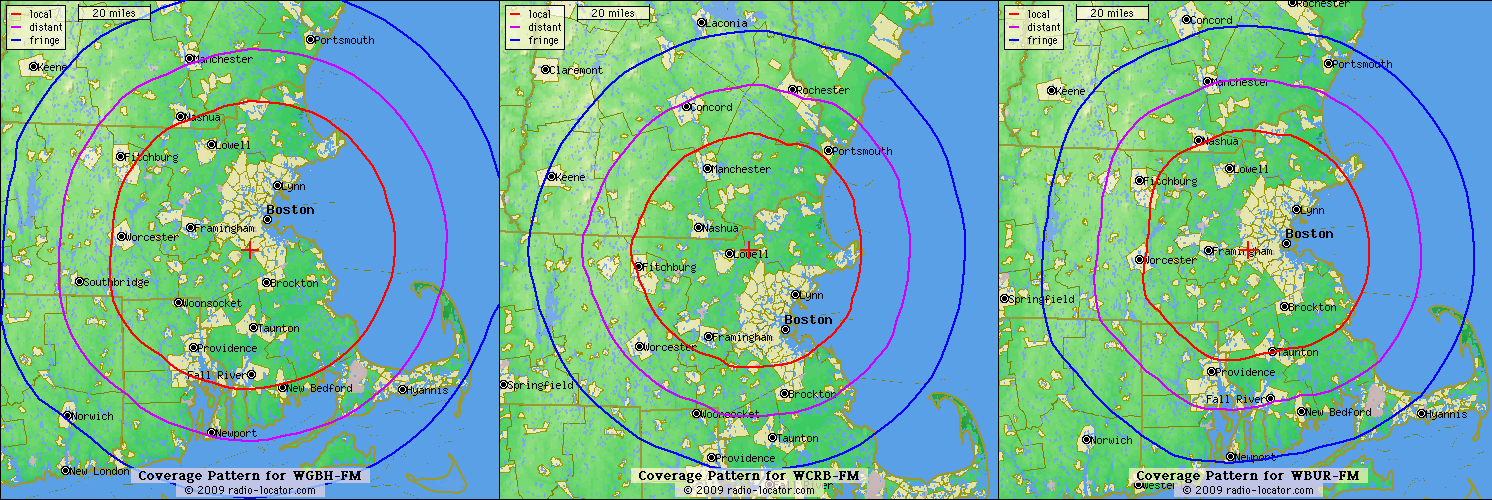The longest thread in the history of this blog belongs to Why WQXR is better off as a public radio station, which I posted on July 26, and still has comments this month. The post followed a complex deal by which the New York Times divested its legacy classical music station, WQXR — and by which the station’s format, call letters, record library and some of its personnel survived as a noncommercial outlet of WNYC, on a different channel with a weaker signal. From the comments one might gather that more listeners were unhappy than happy with the deal. My post mostly presented the upside.
Now here in Boston a similar move is underway. WGBH, “Boston’s NPR arts and culture station” will go the way of WNYC-FM, which phased out classical music starting in 2002, eventually shunting it to HD side-channels and Internet streams while populating the FM signal (as well as its AM one) with news and information programming, which tends to be more popular and to attract more money in listener contributions. By saving WQXR, WNYC returned classical music to the airwaves (although the city was still down one classical station, or two if you want to go back to the very late WNCN.) WGBH clearly had the same thing in mind when it bought WCRB, which was already weakened in the Boston metro when it moved from its old local channel (102.5) to its current channel (99.5) in Lowell. (Wikipedia has good background poop on WCRB’s own long saga.) While both WCRB signals have about the same range, the old 102.5 signal radiates from the Boston FM and TV antenna farm in nearby Needham, while the new one on 99.5 comes from a hill overlooking the I-495/I93 intersection, far to the north near the New Hampshire border.
So now WGBH plans to move its classical programming to WCRB, whch will become a non-commercial station (as did WQXR), and to do more news and information programming on its own home signal (89.7), which is grandfathered at 100,000 watts on Great Blue Hill (hence the call letters) in Milton, on the south side of Boston. In terms of wattage alone, WGBH is New England’s most powerful station. (The largest coverage belongs to WHOM/94.9 on Mt. Washington in New Hampshire, which puts out 49,000 watts from the highest peak in the Northeast.) As a result WGBH can go head-to-head with WBUR/90.9, which is the incumbent public radio leader in Boston. (I’ve looked at the ratings, and WBUR has kicked WGBH’s butt for years — a fact that I am sure has rankled the latter.)
Still, many listeners are not happy. And not just about losing classical music.
WGBH is doing its best to gloss over the signal loss for classical (and other arts & culture) listeners, especially in the southern reaches of Eastern Massachusetts, where WGBH has a very strong signal and WCRB is mostly absent. To demonstrate, here is a comparison of coverage for WGBH, WCRB and WBUR, calculated by Radio-Locator.com:
Click on the image for a legible full-size version.
Still, my own take in the WGBH/WCRB case is the same as it was for WNYC/WQXR: this is the best that could be done for classical music on Boston airwaves — and it offers opportunities not possible for WCRB had it remained a commercial station. Go back to that first link if you want to see what those are.
As for me, I expect to be more likely to listen to a ‘GBH-run noncommercial WCRB than I did to the commercial one. First, the commercials were (and, at this writing, still are) annoying. Second, the WCRB repertoire was pretty close to all-hits, rather than the more varied and challenging fare found on WGBH. There should be a happy medium between the two, and I’m sure ‘GBH will work hard to find it.
But I’m privileged to live on the north side of the metro, so I get WCRB just fine. I think it’s a safe bet that more than one half of WGBH’s listening area won’t get a useful signal out of WCRB. And the area within which listeners can get WGBH’s HD stream is a subset of WGBH’s coverage area.
A digressive word about HD radio. I got one recently — a $99 Teac unit — at Costco. The tuner is remarkably good, and it gets most local stations’ HD side-channels. But “tuning” HD is a counter-intuitive chore. You tune in the partent station, wait for the HD symbol to appear, and then tune to the one or two HD channels of the station. It’s a multi-step selection process, with delays along the way. I’d be curious to know if anybody (beside those who pick a channel and stay put) has had a positive experience with tuning it.
For those who want to compare apples with apples, here’s some data:
- WGBH transmission facility
- WGBH coverage area
- WCRB transmission facility
- WCRB coverage area
- WBUR transmission facility
- WBUR coverage area
One last thing. I for one (and I am sure there are many more) would love to hear Chris Lydon return to Boston’s airwaves. He has been a podcasting pioneer with an outstanding show. But coming on a live station would be fabulous.
Hey, how about Larry Josephson too?

Leave a Reply